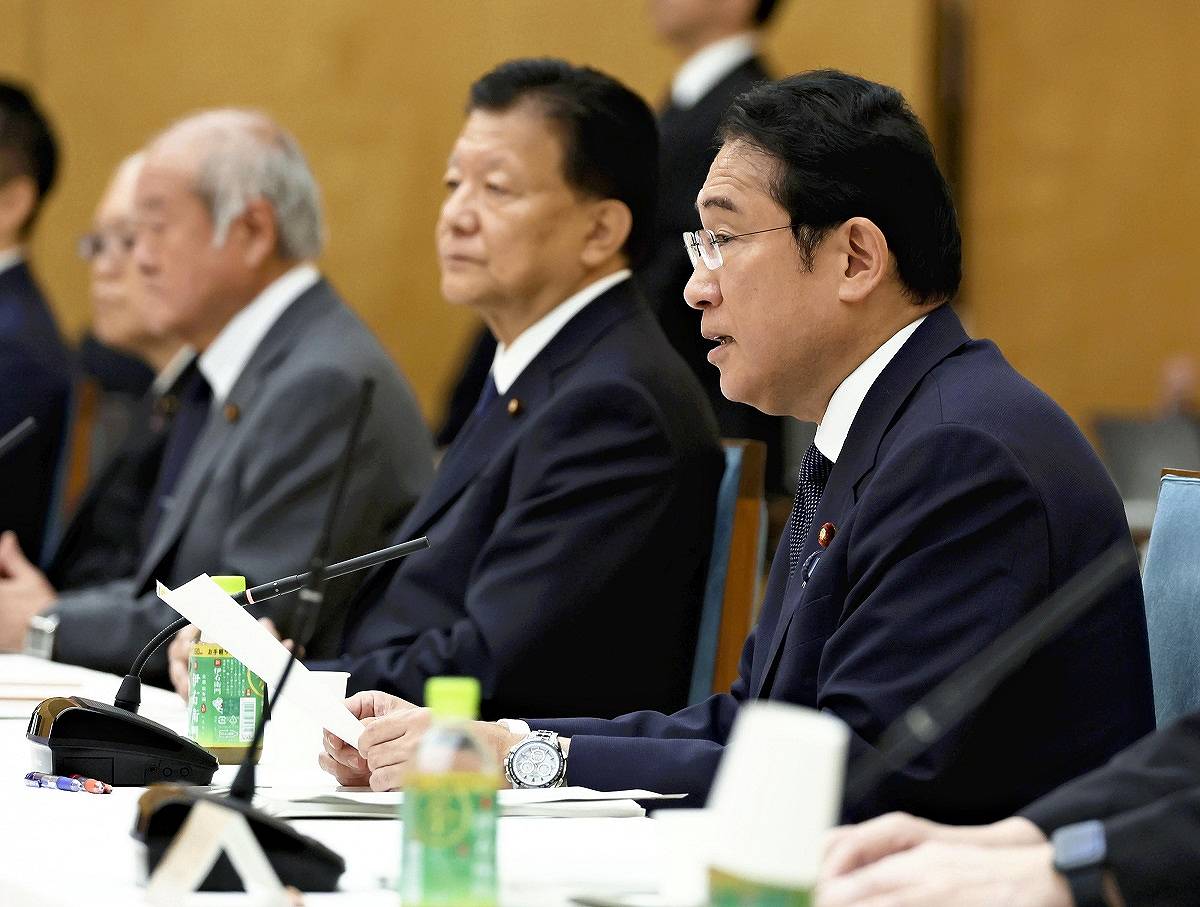Cabinet Approves 3 Key Economic Plans; Aims to Create Stability Amid Population Decline, Break Free of Deflation

Prime Minister Fumio Kishida speaks during a joint meeting of the Council on Economic and Fiscal Policy and the Council of New Form of Capitalism Realization at the Prime Minister’s Office in Tokyo on Friday.
16:42 JST, June 22, 2024
The government on Friday approved three key economic plans: the Basic Policy on Economic and Fiscal Management and Reform, which sets the direction of key future measures; the revised action plan for a “new form of capitalism,” which is a growth strategy; and a regulatory reform implementation plan.
The government noted that real gross domestic product growth of more than 1% is needed to make the economy, public finances and social security sustainable in the 2030s and beyond, when the nation’s population decline is expected to be in full swing. The government expects that a nominal GDP of ¥1 quadrillion will be in sight around 2040 if the nation achieves such growth.
Earlier on the same day, the government held a joint meeting of the Council on Economic and Fiscal Policy, chaired by Prime Minister Fumio Kishida, and the Council of New Form of Capitalism Realization, in order to finalize these plans.
“We aim to realize an economic society in which the next generation can have hopes for the future,” Kishida said at the meeting.
This year’s Basic Policy on Economic and Fiscal Management and Reform, also known as the “big-boned policy,” states that the current Japanese economy faces “a once-in-a-lifetime opportunity to completely break away from deflation and realize a growth-oriented economy” by solidifying income growth and wage increases through such measures shifting labor costs to prices and reforming personnel systems.
The government also devised a new plan to invigorate economic and fiscal conditions, spanning six years from fiscal 2025. In previous plans compiled in 2022 and 2023, the government stopped short of specifying its primary balance goal, but in the new plan, it has set a goal of achieving a surplus in the combined primary balance of the central and local governments in fiscal 2025.
“New form of capitalism” is a signature policy of the Kishida Cabinet with the aim of creating a virtuous cycle of growth and distribution. The revised action plan on this policy contains four pillars of measures, such as support for wage increases targeting small and midsize companies and investment in growth areas including artificial intelligence and semiconductors.
The regulatory reform implementation plan includes a measure to improve the operation of ridesharing, in which paid ride-hailing services are provided by private drivers under the operational control of taxi companies. Such ride-sharing services began in Japan in April, but there are currently restrictions on locations, times and number of vehicles. The plan calls for the government to consider easing such restrictions in case of rain and scheduled events, among other occasions.
Top Articles in Politics
-

Japan PM Takaichi’s Cabinet Resigns en Masse
-

Sanae Takaichi Elected Prime Minister of Japan; Keeps All Cabinet Appointees from Previous Term
-

Japan’s Govt to Submit Road Map for Growth Strategy in March, PM Takaichi to Announce in Upcoming Policy Speech
-

LDP Wins Historic Landslide Victory
-

LDP Wins Landslide Victory, Secures Single-party Majority; Ruling Coalition with JIP Poised to Secure Over 300 seats (UPDATE 1)
JN ACCESS RANKING
-

Producer Behind Pop Group XG Arrested for Cocaine Possession
-

Japan PM Takaichi’s Cabinet Resigns en Masse
-

Man Infected with Measles Reportedly Dined at Restaurant in Tokyo Station
-

Israeli Ambassador to Japan Speaks about Japan’s Role in the Reconstruction of Gaza
-

Videos Plagiarized, Reposted with False Subtitles Claiming ‘Ryukyu Belongs to China’; Anti-China False Information Also Posted in Japan
























